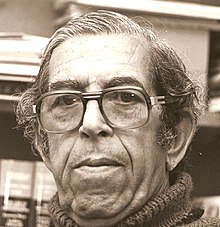Lou Lichtveld

 Clash Royale CLAN TAG#URR8PPP
Clash Royale CLAN TAG#URR8PPP | Lou Lichtveld | |
|---|---|
 | |
| Born | Lodewijk Alphonsus Maria Lichtveld (1903-11-03)November 3, 1903 Paramaribo, Suriname |
| Died | October 7, 1996(1996-10-07) (aged 92) Amsterdam, Netherlands |
| Other names | Albert Helman |
| Occupation | Playwright, poet, organist, journalist, politician |
| Political party | National Party of Suriname |
Lodewijk 'Lou' Lichtveld (November 3, 1903 – October 7, 1996) was a Surinamese politician, playwright, poet and resistance fighter who wrote under the pseudonym "Albert Helman".
He gained notability in 1923 when he published the poetry collection De glorende dag (The Dawning Day), a milestone in immigrant literature in the Netherlands. He followed it three years later with Zuid-Zuid-West (South-South-West).[1]
In 1931, he published a play based on the third voyage of Willem Barentsz.[2]
Contents
1 Biography
1.1 Spain
1.2 Resistance
1.3 Public Offices
2 References
Biography
Lou Lichtveld was born in Paramaribo, Suriname into an elite family. At the age of twelve, he went to the Netherlands to become a priest at boarding school Rolduc in Kerkrade. He completed this training after a short time and returned to Suriname. At the Paulus School in Paramaribo, he completed a music study. After that he worked as an organist and composer.
In 1922, he again went to the Netherlands to start a teacher training and to continue his music studies. After completing his studies, he worked as an organist in Amsterdam and later as a journalist.
His first work in book form appeared in 1923. It was a collection of poetry called De glorende dag ("The dawning day"), which was still published under the name Lodewijk Lichtveld. He used the pseudonym "Albert Helman" for the first time in 1926 on his debut novel Zuid-Zuid-West ("South-South-West"). This novel describes his memories of his country of birth and the exploitation of Suriname by the Dutch colonizer. Many more novels, essays and poems followed. He also worked as a playwright and as a translator of foreign literature into Dutch. His musical works were shown in the silent film Rain (1929) by Joris Ivens, which appeared in 1932 as a sound version with a score composed by Helman film music.[3]
Spain
In 1932, Lichtveld moved to Spain. Here he fought on the side of the Republicans in the Spanish Civil War against the fascists under General Francisco Franco. For the papers NRC Handelsblad and De Groene Amsterdammer, he wrote articles about the civil war. After Franco's victory, Lichtveld fled to North Africa in 1938, from there to Mexico and finally returned to the Netherlands in 1939.[3]
Resistance
In the Netherlands, he was mainly concerned with the fate of the Jews who had fled Germany. In 1940, he wrote on behalf of the Comité voor Bijzondere Joodse Belangen ("Committee for Special Jewish Interests") the book Millioenen-leed ("Millions of Suffering").
After the German invasion of the Netherlands in May 1940, Lichtveld went into hiding, because he could no longer occur as a known anti-fascist in public. In the resistance, he was active as a forger of personal documents and as a writer of resistance slogans. He also wrote for the illegal paper Vrije Kunstenaar ("Free Artist"). During the occupation, he wrote under the pseudonyms Joost van den Vondel, Friedrich W. Nietzsche, Hypertonides and Nico Slob.[4] In addition, he was a member of the Grote Raad van de Illegaliteit ("Great Council of Illegality") and the emergency parliament.[5]
Public Offices

Lou Lichtveld in 1955
In 1949, Lichtveld returned to his native Suriname, where he was the Minister of Education and National Development and Minister of Health until 1951. After his resignation as Minister, he still held various other offices. He was chairman of the Court of Audit of Suriname and director of the office folk reading. In 1961, he was appointed to the Dutch Embassy in Washington, D.C. Here, he was part of the delegation of the Kingdom to the United Nations, which was specifically concerned with the perception of Surinamese interests.
After retiring, he settled on Tobago, later in Airole and finally in Amsterdam, where he died at the age of 92 years.[3]
References
^ Michiel van Kempen. "Een geschiedenis van de Surinaamse literatuur". Deel 5 (in Dutch). DBNL.
^ "Play about Willem Barentsz".
^ abc Michiel van Kempen (27 November 2010). "Albert Helman: De eeuwige migrant" (in Dutch). Vijfeeuwenmigratie.nl.
^ Albert Helman, Schrijversinfo.nl
^ Interview door Joos Florquin in 'Ten huize van..' Davidsfonds, Leuven 1978 via DBNL